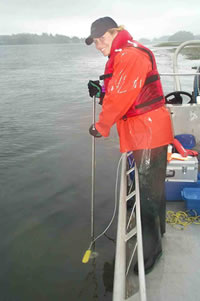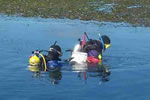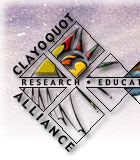Education activities in
the Clayoquot Alliance
Community-based research activities in the region involve
local community members and First Nations in research design,
implementation and evaluation. Research results are shared through
community-based events and forums. Graduate students and post-doctoral
fellows at the University of Victoria pursue background theoretical
and conceptual work around community-based research, participatory
policy formation and barriers to implementation.
|
Courses
and seminars |
|
Organized by the Raincoast Education Society with help from
the Clayoquot Alliance for Research, Education, and Training, the
Raincoast Energy Program Series includes a variety of talks and
workshops around the topic of energy conservation, energy efficiency,
and the use of alternative, sustainable energy sources. All events
take place at the Raincoast Interpretive Centre,
451 Main St., Tofino, BC (Box 815, V0R 2Z0). For more information
please contact: 250-725-2560 or res@island.net.
Environmental Studies 300B: Environmental Issues  Dates: July 6 - August 19, 2004 Dates: July 6 - August 19, 2004
Location: University of Victoria
Instructor: Derek Shaw
The purpose of this course is to further develop students’ ability
to understand, analyze, and critique environmental issues. We will
explore environmental issues through the theme of consumption;
by treating environmental issues as issues of human consumption
of resources we will come to an understanding of the relationship
between contemporary society and the environmental problems that
it creates. We will use the concept of an “ecological footprint” to
analyze our impact on the environment, collectively and individually. In addition to understanding environmental issues generally,
we will consider ethical theories regarding the evaluation of human
actions with respect to the environment. Class format will usually consist of a presentation by the instructor
followed by discussion. After the first three weeks, we will be
having group presentations, also followed by discussion. For each
class, students are expected to complete all assigned readings
and to participate fully in class discussions. This course takes place over a relatively short period of time;
in addition to doing the reading, students should be working on
class requirements every week starting with the first week. The
syllabus identifies readings as well as specific tasks that students
should be working on each week. Dates: May 1-30, 2003
Location: University of Victoria and Clayoquot Sound
Instructor: Kelly Bannister
Course advisors: Rod Dobell, Stan Boychuk Course web site » What role might academic research play in assisting communities
in resolving environmental and social problems arising in the process
of transformation from a resource-based economy to a knowledge-based
society? What challenges are involved in collaborative research
between people in universities and in communities? What barriers
are faced in bringing theoretical features of 'boundary work' into
the social realities of cross-cultural 'borderlands'? The objective
of this course is to explore these questions, and to problematize
the concept of" community-based research", in both theoretical
and practical contexts. The focus will be on past and present social
and environmental research in the Clayoquot Sound region of western
Vancouver Island. The course will draw on both written materials
and research relationships developed through the Clayoquot Alliance
for Research, Education and Training. The course will include background
reading, lectures and class discussions at the University of Victoria,
and a 10-day field trip to Clayoquot Sound where students will
be exposed to numerous community research projects and contexts,
and have an opportunity to engage directly with local First Nations
and non-First Nations community members involved in local research. |
| |
Graduate student
projects |

Researching eelgrass ecology
in Clayoquot Sound |
Eelgrass ecology in Clayoquot Sound
 Jennifer Yakimishyn,
MSc Candidate, Department of Geography, University of Victoria Jennifer Yakimishyn,
MSc Candidate, Department of Geography, University of Victoria
Project proposal » (108 kB PDF)
Slide presentation »
This project's outreach program will provide the local youth community
with the opportunity to gain invaluable work experience in marine
biology through hands-on scientific research. During the school
months high school students will be provided the opportunity to
gain experience in marine biology through the Career Prep program
at Ucluelet Secondary and in July and August through the Young
Canada Works program. By assisting in beach seining and eelgrass
sampling activities during the school year youth will gain appreciation
and understanding for local marine habitat and this awareness will
facilitate environmental stewardship in their community.
Grey whale prey distribution in Clayoquot Sound
 Brian Kopach,
MSc Candidate, Department of Geography, University of Victoria Brian Kopach,
MSc Candidate, Department of Geography, University of Victoria
Project proposal » (68 kB PDF)
Researcher's web site »
Slide presentation »
With access to the knowledge gained over the last decade of working
with the whales in the Sound I intend to create a workbook-style
manual that incorporates text, graphics and pictures describing
the research the Whale Lab has carried out. The material will be
aimed towards senior secondary students, primarily because ecology
is synthetic and requires a bit of understanding in a number of
subject areas, and is generally introduced in senior biology classes.
Transcoding indigenous cultural knowledge: Assessing ethnographic
hypermedia
Towagh Behr, MA Candidate,
School of Environmental
Studies & Anthropology,
University of Victoria.
This thesis project has consisted of two distinct
phases. The first phase was the provision of assistance to Nuu-chah-nulth
Central
Region Language Project in
the work that has been undertaken to revitalize Nuu-chah-nulth
language and culture. The second phase of the project has been
a broad contextualization and investigation into the interface
between the production of indigenous cultural knowledge and new
forms of media. |
| |
Courses under development |
| |
Space and scales: The cultural, linguistic, ethnic,
socio-economic, environmental, and political definitions of borders,
boundaries and frontiers
Graduate Course Development Proposal (Interdisciplinary Studies)
Instructor: Emmanuel Brunet-Jailly
This interdisciplinary course development project proposes to
focus on borders, boundaries and frontiers because they are fascinating
case studies of a transformation that seem to challenge the traditional
coherence of intergovernmental and international relations. The
post-modern state is progressively evolving toward a hybrid and
multiple, mosaic-like system of territorially overlapping incongruent
spaces. Multiple special constructions exemplify this transformation:
trans-border regions, twin cities, city networks, and autonomous
areas, transnational and transcontinental native, linguistic, ethnic,
cultural or environmental communities. All seem to form our postmodern
world.
The continuity of the modern world viewed as a territorial logic
constructing space, identity and security does not wither away,
however, but is juxtaposed and intermeshed with postmodern new
spaces and collective identities that organize in networks, virtual
spaces, mixed and contingent identities based on gender, ethnicity,
religion or language or culture. At the core of those moving junctures,
are border, boundaries and frontiers where those transformations
crystallize.
This course will address the following questions: what are borders,
boundaries and frontiers? How do border, boundaries and frontiers
define spaces, scales and communities? How do border, boundaries
and frontiers link and delineate simultaneously? What institutional
architecture organizes those overlapping constellations of communities,
identities and polities?
Changing concepts of property rights:
Historical overview and current developments
Graduate Course Development Proposal (History)
Instructor: Martin Bunton
The focus of this course is on the changing role of property rights
in regulating claims and rights in land, and resources generally.
We will examine theories and perspectives that help explain the
creation and legitimation of property rights; the avenues and means
by which
those perspectives have spread globally; the critiques that have
emerged to contest dominant, private property, narratives; and
the prospects of reconfiguring property systems as local communities
adapt to changing global economy and governance mechanisms. Much
of our discussion of current developments will be comparative and
historical, but also rooted in empirical research in contemporary
British Columbia examples: students will be required to develop
and
present a case study of their own for class presentation. |
|


















